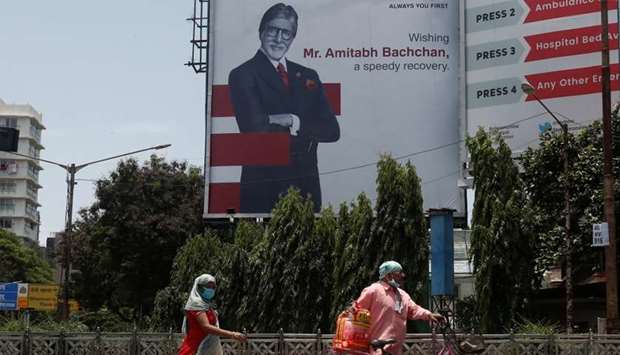The spread of coronavirus in India may speed up during peak monsoon and winter, with a continuous fall in temperature, claims a study conducted jointly by researchers at the Indian Institute of Technology and the All India Institute of Medical Sciences.
Every degree rise in temperature corresponds to a 0.99% decrease in the number of cases and an increase in doubling time by approximately 1.13 days, implying a slowing down of spread, said the study titled ‘Covid-19 spread in India and its dependence on temperature and relative humidity’.
The study, led by V Vinoj, Assistant Professor of the School of Earth, Ocean and Climatic Sciences at IIT-Bhubaneswar, examined the Covid-19 outbreak patterns and cases in 28 states between April and June.
Particularly, the researchers focused on the relationship between Covid-19 spread and environmental factors such as temperature, relative humidity, specific humidity, and solar radiation.
The results showed that temperature and relative humidity have a significant impact on the disease growth rate and doubling time, according to the abstract of the study posted on ResearchGate, a professional network for scientists and researchers.
The study is currently at pre-print stage and yet to be peer-reviewed.
An analysis for relative humidity revealed that more moisture leads to a higher growth rate of Covid-19 cases and reduced doubling time, said the study.
Lower specific humidity and higher surface-reaching solar radiation reduced the spread and increased the doubling time similar to that of temperature, the results showed.
The study comes at a time when daily Covid-19 cases are setting new records.
India's total coronavirus cases have already surpassed 1mn, with a record 38,902 new cases reported in the past 24 hours.
With 543 new deaths, the total death toll stood at 26,816 on Sunday.
In other developments, on the initiative of Delhi police, a 'Plasma Donation Campaign' was launched at AIIMS in New Delhi on Sunday.
Federal Minister of Health and Family Welfare Dr Harsh Vardhan and Police Commissioner S N Shrivastava attended the launch event.
‘The objective of the campaign is to encourage people to come forward to donate plasma to be used for the treatment of Covid-19 patients,’ Delhi police spokesman Anil Mittal said.
In all, 26 personnel including a woman constable of Delhi police kicked off the campaign by donating their plasma.
‘More than 650 Delhi police personnel are likely to donate their plasma during the week-long campaign,’ the spokesman said.
Randeep Guleria, director of AIIMS, appreciated the initiative of the Delhi police and termed the donor police personnel 'Super Corona Warriors', as being affected by the deadly virus they first fought against it and then voluntarily donated their plasma to save lives of others.
He appealed to people to donate plasma as it would help treat critical patients.
‘Dealing with coronavirus has been a unique experience as none of us knew what to do,’ Shrivastava said.
‘The police had two major responsibilities - to maintain law and order and to enforce the lockdown. At the same time, managing our own health and motivation of force were also a challenge. Being visible arms of the government, police must ensure implementation of government's directions.’
Being frontline warriors, police personnel were most susceptible to the exposure of the virus. As a result more than 2,500 personnel got infected and a dozen succumbed to the virus in the line of duty.
However, the recovery rate is more than 84% as more than 2,100 personnel have recovered and resumed duty.
Lauding the efforts of Delhi police for taking the initiative to build the plasma bank, Vardhan called it noble and inspiring.
‘Delhi police personnel have set an example by voluntarily donating plasma in order to save lives of others, while ignoring their own sufferings. It will inspire other corona warriors to donate their plasma,’ he said.

